Catching up with Niraj Chag, Composition for TV & Film, Theatre and the Future of Music.
- Djinn
- Apr 26, 2020
- 26 min read
Updated: Jan 18, 2023
Djinn: So! Do you want to hear my provisional intro?
Niraj: Go on then...
Djinn: Ha-ha. Thanks to Jackie Khan at the Bug Bar in Brixton for believing in me, inviting me back to perform and calling talent scouts without telling me about it. As a result, I was introduced to Niraj, my producer turned mentor/lifelong friend. It’s been some time since we caught up in person but our conversations always continue where they left off. Niraj is a multi-instrumentalist, composer, producer of 5 albums and hundreds of other releases for TV, film and dance. I’ve always been grateful for his support when I’ve needed it. I figured it was time to catch up properly and talk about his work and his thoughts on the future of music. Enjoy!

Djinn: Question; what first brought you into music and when?
Niraj: I was brought into music at quite a young age, probably around 11, when my brother set up a band in Southampton.
Djinn: A.J?
Niraj: Yea, so, they were playing Bollywood and Bhangra music so I ended up kinda being the guy who did the least amount in the band. My job was to turn this drum machine from 1984-85 on and off. (Niraj turns and points at the machine)
Djinn: I was looking at that when I came in. What is that?
Niraj: That’s the Roland TR 707. So you’ve heard of the 808 and the 909. The 707 was the one that was basically the junior version of those which didn’t appreciate in value or status over the years sadly. My job was to press start and stop on the machine. That was my one job and it scared the hell out of me. I was so nervous being on stage!
Djinn: It’s live isn’t it!
Niraj: Yea, It’s crazy. Then probably around the age of 12 I set up a little hip-hop band with my cousin and a friend of mine where I was playing keys and bass at the time. Then at 15 I got into technology and then set up my own little studio in Southampton.
Djinn: Did you study music per se, or are you completely self-taught?
Niraj: All self-taught
Djinn: Well, what you have achieved as a result of self-education is evidence in itself of what people can achieve if they really want to do it.
Niraj: Absolutely, there are no barriers now. When I was starting out, the technology we have now didn’t exist so what you can do on a laptop now is what you could do in Abbey Road at that time really. So, when I started out, I had a keyboard hardware sequencer limited to a 16 track with a sequencer with 16 note polyphony and 20 thousand events within the composition. Now it’s unlimited. I don’t think there is any reason why anybody can’t do it.
Djinn: What would you say to someone who wants to make music but doesn’t pursue it due to lack of study within the field?
Niraj: Then you probably don’t really want to do it because I think if you really want to do it, it wouldn’t matter if you studied or not, you’d be compelled to do it.
Djinn: It reminds me of a time I was doing a gig, and someone approached me and said, ‘I’d give anything to be able to sing,’ and I said, ‘no you wouldn’t, otherwise you’d be singing already.’
Niraj: This is it, when people say that, it’s a little bit disingenuous because they’re saying I’d do it if I knew music theory, but what they’re really saying is I’d be compelled to do it if I can make money and become successful from it. Not that I want to do it for the sake of doing it. You’re treating music not as an end but as a means to an end, and that’s a very different system and you have to be honest with yourself as to why you’re doing it. Not to devalue that as an end result but you need to be honest with yourself. Are you doing this to make music or are you doing it to be famous or to have money?
Djinn: What’s your why!
Niraj: Once you know your why, then that dictates your how!
Djinn: I’m gonna steal that one, (Niraj Laughs) I’ll credit you.
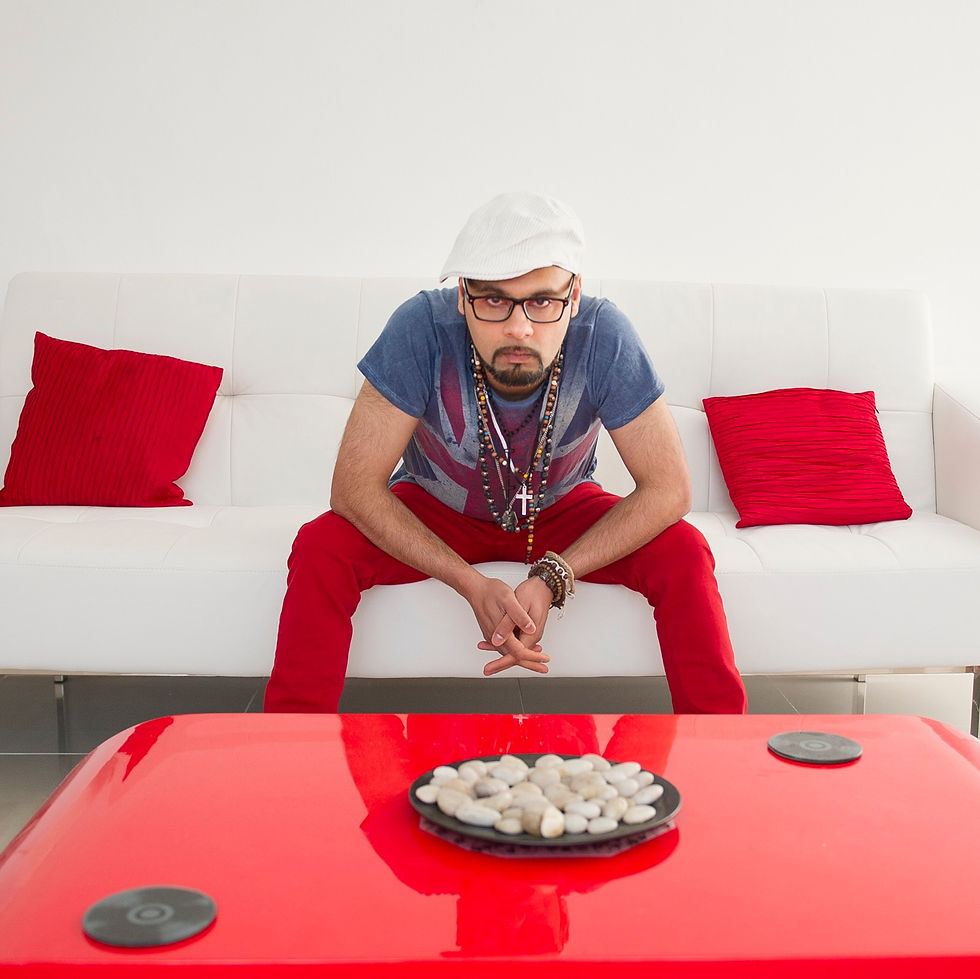
Djinn: Speaking of your albums which we will talk about in detail. Who was your biggest influence growing up, who inspired you to become a musician? Not someone who has inspired your sound, but inspired you to become who you are as a musician.
Niraj: It’s an interesting question, I don’t think I’ve ever been asked that because you’re not asking about music influences. It would probably be my brother for making me feel like I could do it, and my dad who bought me a synthesizer when I was 15. To have a synthesizer; which were not cheap things. It took me two years of nagging him every day. At 15 years old he bought me a synthesizer workstation, and at 17 I got a sampler and by 19-20 I had a record deal. So probably my brother and dad influenced me in that sense because dad supported me in regards to technology and my brother made me feel like maybe I could actually do this.
Djinn: Who better than your own family.
Niraj: Absolutely.
Djinn: Your first album New Breed, tell us about that.
Niraj: Outcast Records released a compilation launching three different artists, it was called Outcast Newbreed. Even before then I had a few vinyl’s out on a few labels. New Breed was my first ever involvement on an album. Outcast launched three artists packaged into one project called The New Breed of Artists. Like 3 E.P’s combined into one album. I had four tracks on there. That was the launch of my career as an album artist.

Djinn: After that you had: Along The Dusty Road, Lost Souls, Mud Doll and the Kathat E.P. With New Breed being your first foot into the album door.
Niraj: Yea, that was my foot in, then Along The Dusty Road was my first solo. Rafta Rafta was a soundtrack album for a show at the Royal National Theatre. Lost Souls was my second studio album and Mud Doll was the third studio album.
Djinn: Listening to your albums, obviously I have heard them all, ’Kanya,’ is my favourite track of them all. That flute! Originality has always been your companion and something really important to you since the beginning of each project you bring to fruition. You always take a unique approach to every new project you do. What do you think was the biggest contributing factor of you becoming a ‘new breed along the dusty road’ of the music business, and not finding yourself a ‘lost soul.’ What was your drive to always be original instead of following genres that people set?
Niraj: Lol great wordplay. I think it’s very simple actually. Your question is far more complicated than my answer and my answer might be a little bit underwhelming. See, for me, I don’t think of it in any of those terms. I think of it in terms of authenticity, so when I’m creating a work, I don’t want to be that person who’s trying to not sound like other people. I’m not trying to sound original. If I do something out of rebellion, I’ll fall into the trap of being non-genuine. I won’t be authentic and lose my authenticity to rebellion. That rebellion isn’t who I am, even that would be a contrived manifestation of me because I’m reacting to this and therefore that reaction is coming out in me ‘trying’ to be original. With an album, I have a concept and an idea that I want to create.
Djinn: Going into your sound created by you and fuelled by your own inspiration, are you able for the listeners who haven’t heard your albums, to give a one or two-sentence description of each of the albums you’ve released?
Niraj: (Niraj laughs) Ooo, that's a tough one.
Djinn: I will say the album name, you give the description.
Niraj: Ok
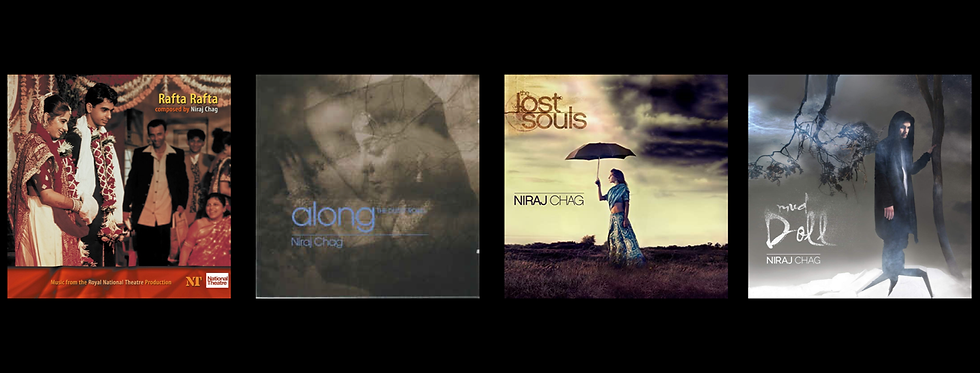
Djinn: Rafta Rafta.
Niraj: That was such a long time ago, Rafta Rafta, A part of me was cultivating the art of scoring, and the influences are probably folk, Ghazal and a little bit of Qawali.
Djinn: Along The Dusty Road.
Niraj: Along the Dusty Road was an album that took a long time to make. I actually wrote a whole album that I was going to release in 2003 and I scrapped it because something didn’t feel right. From the album there are only three tracks that made it to Along the Dusty Road, in some way shape or form, and all the other tracks were new tracks, so I scrapped the entire album. It was a very different album in 2003. It was a gut instinct thing where it just didn’t feel right, I wasn’t ready to release an album and I’m so glad that I didn’t and that I waited until I knew a lot more about what I was wanting to do.
Djinn: What was your favourite track putting the album together?
Niraj: It changes all the time, but right now my favourite would have to be ‘Kanya’. I think it’s because I’ve heard it a lot more, and I don’t listen to my albums much. I just get tagged in it a lot more often by people who are choreographing dance to it so I hear it a lot more often and I happen to be doing music for dance a lot more recently so it’s there. Next month it might be something different.
Djinn: Lost Souls.
Niraj: Lost Souls is really an album about questioning everything like identity, reality and morality. I was reaching a phase in my life where I was asking a lot of questions and having doubts about who I am and what my place is on this planet and that’s really where the album comes from, I think.
Djinn: It kinda of reminds me of an interview I did with Jon B where we talked about the questions you ask yourself as you mature. He started asking questions and he named his album, Stronger Every Day. He had a divorce and his studio burned down so he wrote a song called, ‘Through the Fire,’ that makes a lot of sense. So, your favourite song on that album if any?
Niraj: Actually, one track that I have been listening to recently that I like a lot is a track called ‘Mori Atariya,’ because I like the way it makes me feel. It just makes me feel good and that’s why it currently resonates with me.
Djinn: Mud Doll.
Niraj: Mud Doll is about the different phases of life. It starts with birth, a track called ‘Maa,’ so basically life starts with a mother, the starting point where we are all born is a mother. The penultimate track is a requiem in Gujarati and then the final track is called ‘The Blue,’ which is the idea that if there is anything beyond life that it is some sort of place of peace, not necessarily an afterlife but peace. Whether or not you believe in something after death, there is peace regardless.
Djinn: Hopefully. (Both Lol)
Djinn: The Kathak EP.
Niraj: A four-track E.P of music for Kathak North Indian dance. I love the form, I have done a few tracks like ’Kanya,’ which comes from that form of dance and I think it’s a very expressive form and the vocabulary is very interesting. Kathak is very visceral and emotive, even flamenco comes from Kathak. If you think about the passion that flamenco has, Kathak has that same deep cathartic expression.
Djinn: The song that you did from the album, Along The Dusty Road, ‘Khwaab.’ The Bengali singer you have on the song, you have worked with for quite some time, Mellissa Baten. How did she come into the project?
Niraj: I have worked with Mellisa for many years, she co-wrote that song. She is brilliantly talented.
Djinn: It was always my number 1, but somehow ‘Kanya,’ kind of almost crept in there.
Djinn: Unlike most musicians nowadays you are also heavily involved in theatre and film scoring. What brought you into theatre and what purpose does it fulfil?
Niraj: I think I fell into theatre; I wasn’t actively pursuing it. I just put out albums and through that, people approached me, theatre companies approached me. They contacted me and I ended up basically composing for theatre and musicals. It gives me something that no other form gives me. There is something you get from composing for theatre that you don’t get out of composing for albums and film. It’s more dynamic, things can change.

Djinn: I have a list of theatre events you have been involved in from the start. (List attached) Which out of these theatre productions would you say were the most memorable for you and influenced your career?
Niraj: Interesting question, actually the first-ever theatre musical that you came and saw, ‘Baiju Bawra.’
Djinn: Which was brilliant, with that really talented singer who was in the Scorpion King movie. .
Niraj: Karen David

Djinn: That's it! Karen David, which again was really good.
Niraj: That was really influential because I had never seen a stage musical, and now I’ve ended up composing for a musical.
Djinn: Proper stepping out of your comfort zone.
Niraj: Yea, I didn’t know what a musical was, it was only after I did the musical that I went to see one. That was a real defining moment for me because it was the first theatre piece where I was very involved. It was a real learning curve, it was my concept, my idea, the whole thing so I was really invested in it. They aren’t cheap to make. They let me do whatever I wanted or at least come up with a concept and make it into a full-blown musical, which costs hundreds of thousands of pounds.
Djinn: Who funded it?
Niraj: Theatre Royal Stratford East.
Djinn: No pressure, right?
Niraj: The director, he really believed in me, even though I was a young kid at the time.
Djinn: It was really busy; I remember seeing it on the news.
Niraj: Yes, it had a lot of profile.
Djinn: So, 2018 ’The Village,’ Theatre Royal Strafford East.
Niraj: So, it’s almost gone full circle in one sense. The second album was really important, Rafta Rafta, (National Theatre). That was a soundtrack album for the show. I was working with Sir Nicholas Hytner who is a legend in theatre and the royal national theatre and then went on to make a film out of it which I scored with Studio Canal called, All In Good Time.
Djinn: Aside from the theatre of which you have done two shows already in 2019, you have also done lots of scoring for the BBC, ITV, etc. How did that come about?
Niraj: Most of it comes about via word of mouth. I got a gig early on in my career for the BBC, which led on to somebody in that production asking me to compose for something else and so forth, which led to one piece after another. Or people have heard my albums and work and asked me to compose something for their film and so on.
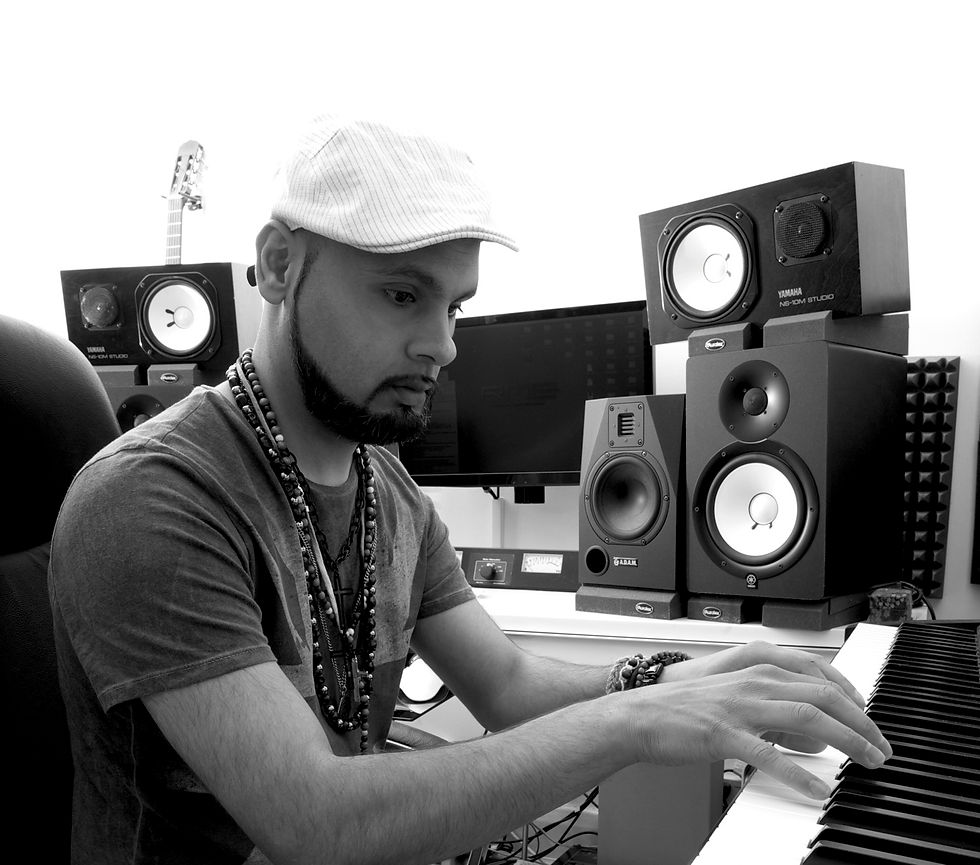
Djinn: It sounds like throughout your career you found yourself in the right place at the right time doing the right thing?
Niraj: I just try to put out music as authentically as possible. I don’t plan it for any industry or create something that I feel an audience will like, or to try and find an audience.
Djinn: You’re just being you and the audience is finding you?
Niraj: I am just putting music out that I would listen to myself and that I like. If other people like it then that’s wonderful.
Djinn: How do you view the difference between the 9-5 working-class Xennials with crazy schedules, who still make time for theatre with friends and family in comparison to Generation Z, who are more interested in quick, short, entertainment such as Vines, TikTok, Instagram stories and Netflix for entertainment? What is the future?
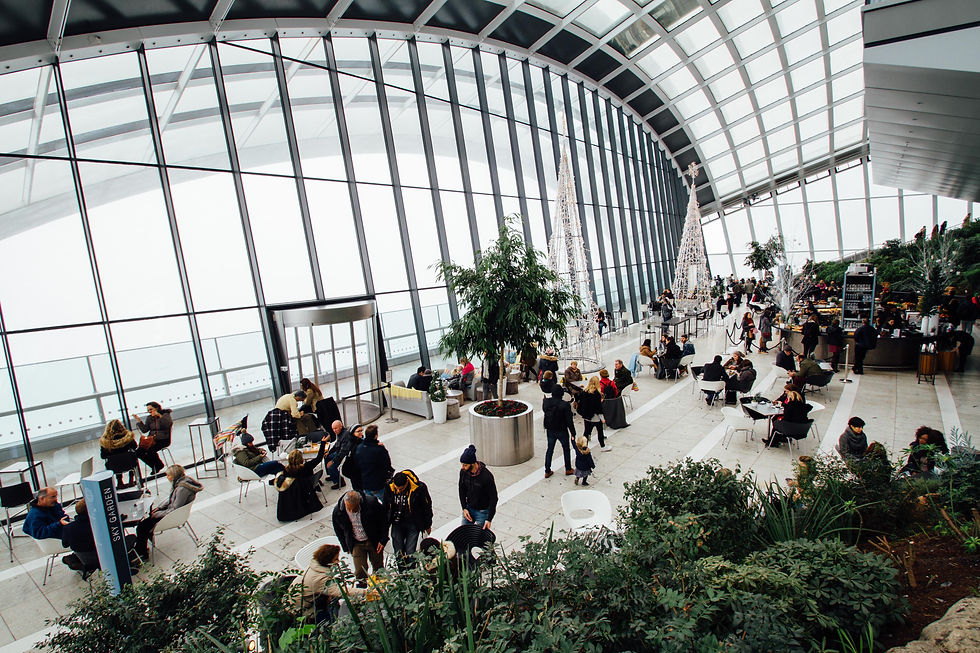
Niraj: I think it's going to be tough for theatre because young people are not engaging as much. I think there’s something interesting happening, there’s a lot of press around the millennials and Gen-Zs about how they have very little attention span, constantly on social media. We find that on one hand that’s happening, but then there’s a bit of a dichotomy because, on the flip side, long-form content is massive. People are consuming 3-hour podcasts. Look at Netflix and people binge-watching programs. People are watching 6-7 programs in quick succession.
Djinn: Are they not the people who want to be entertained on the go, at home? Is theatre not something they may feel they need to make the extra effort for?
Niraj: Maybe, but the thing is that could also work the other way where everything is available on your phone. If you look at the music industry now, gigging is huge, that’s where the money is. People will pay. They don’t want to pay £10 for an album when they can get it for free but will pay £100 to see some stadium act live. So, people are paying for experiences more. Going to the theatre is an experience. I think there is an argument that it could go that way but the difficulty theatre has is how is it going to engage with this generation.
Djinn: Yea, exactly that. I think you’ve hit the nail on the head with that. They need to make it attractive to Generation Z.
Niraj: Yea, right now, a lot of theatre seems to be missing audiences, especially in London, it's a cosmopolitan city and you need to aim for a wider demographic. What resonates with a lot of people? I think a lot of theatre has been aimed at a myopic demographic and that needs to change.
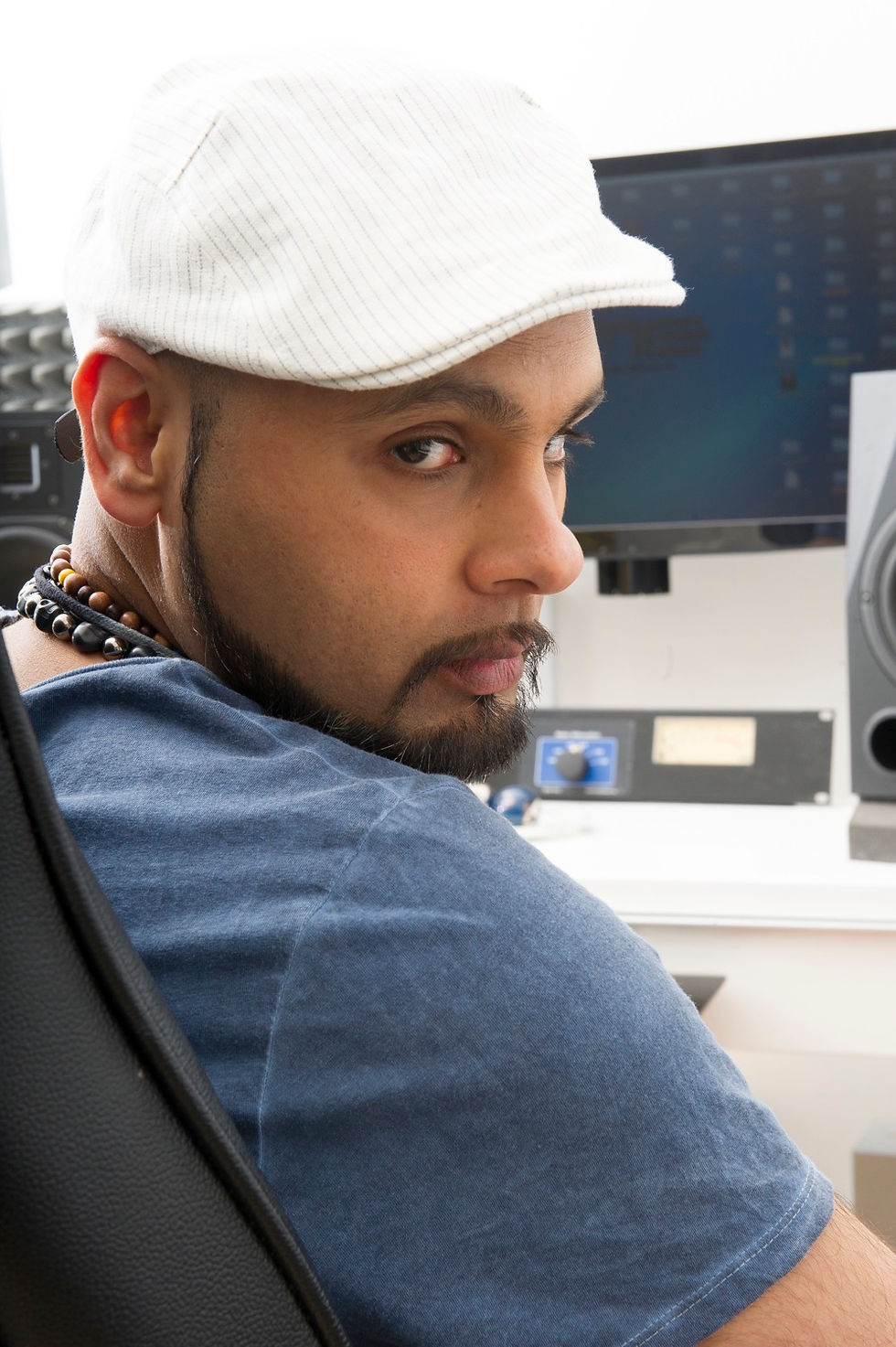
Djinn: It’s almost 2020. Gone are the good days where you can leave class and go into town with a friend to buy the CD you’ve been waiting for. Napster changed all that. Our relationship with music has now changed. What are your thoughts on those changes, CDs vs streaming?
Niraj: I don’t want to seem like someone who lives in the past. Stuff has changed. I love the CD format and what I love most is the resolution, its much higher than how people consume music now. The resolution is great, so when I’m making an album, I’m working with full resolution Wav files. When you’re streaming, you’re not listening to it in the same fidelity that it was intended to be consumed. Having said that, I think these codecs are amazing, MP3 is an amazing codec, considering how much data is being thrown out. I question how many people can tell, even people who are audiophiles. How many people in a blind test can tell between full resolution MP3 with a full resolution Wav file? I bet you that it's not gonna be as easy as we think. So, it’s an amazing codec but a part of me still thinks, I spent all that time working on a high resolution for it to then be squished down and the bottom end, being crushed. Some algorithms intelligently trying to figure out what I’m hearing and what I’m not hearing.
I think that something has been lost in the joy of going to HMV and looking at albums, holding an album, smelling an album, taking it home and having it immediately there. Putting it in your record player or CD player and playing it. There’s something very tangible and wonderful about that experience, the physicality of it.
Djinn: How do you think this will affect the future relationship of artists and fans.
Niraj: We have to offset the tangible joy or buying an album with the less linear form of discovering music through online outlets and through streaming. We have been exposed to a lot more different music because of streaming and the internet than we would have if we just listened to music as we did when we were growing up. Think about it. If I looked at your albums, I bet you that I have a lot of the same albums and influences. I bet you have some Michael Jackson and Madonna albums. I’m showing our age now, but our cultural influences were very similar. Now if I looked at your streaming history today against mine, I bet there will be a lot more difference, some real curveballs in there. We have discovered stuff on our own independent journeys that have no correlation to each other and that’s what I think is the pro side to the streaming argument. On the whole there’s probably still some similarities because we are a tribal species. But there’s also more random stuff in our collection because we’re being exposed to things we never knew we loved without this technology, otherwise we’d still be listening to Michael Jacksons bad, etc.
Djinn: That’s a really good outlook on it, I’ve found things on Spotify from the 80s that I didn’t even know existed. What I knew was because of TOTP or another source of entertainment to find out what we should refer to.
Niraj: Yea, yea.
Djinn: I think Spotify would really like you as their representative. (Both Laugh)
Djinn: As a result of music becoming so readily available, technology has moved forward, prices have come down, music software prices have come down. I remember paying over £700 for Logic, then Space Designer a similar platform for over £500, which later came free with an updated version. All these prices came down and the devoted musicians paid the price. Fruity Loops has come down. The market has become open to everyone. How do you think that affects the future of music for those in the industry who feel as though they paid the price of longevity, and now find themselves overwhelmed with newcomers who made a beat and easily placed it on Spotify?
Niraj: See now this question is a contentious one, I’ve been asked it before. I think the problem with this area is that it reeks of insecurity because the fear here is that somebody that’s been producing for over 20 years could be overshadowed by someone whose been producing for 5 minutes.
We don’t like the friction that that causes because of the sacrifice but know what, who gives a f**k because ultimately, you could work your balls off and not have a hit. This is the lottery we’re in and we have to accept that somebody might hit gold straight away without paying any dues. You know what? Fair play to them. That’s fine. Secretly don’t we all on some level wish we were that person, because s**t, that would be great. (Both crack up laughing)
Djinn: I didn’t even work for it.
Niraj: 20 years of my life! (Lolz continue) So I can’t hate on that, nor can I hate on the person that works for 20 years, it's all about what you want to do and I think that it doesn’t matter. It could be your first beat and you become massive from that 1 beat, or it could be your ten-thousandth beat and you have a mediocre amount of success. Ultimately what we are in, the longevity of any of these artists isn’t going to be anything except their ideas. Everyone has access to the same technology, it's inexpensive now, it comes down to your ideas, they will make a long-term career.
Djinn: What do you think will happen to those who use Logic Pro.
Niraj: Well clearly, they will all die on the spot, lol. It’s almost like saying, s**t man what’s gonna happen to all those people who have an iPhone 6 when the iPhone X comes out. These people are just gonna die, what are they gonna do, how are they gonna eat?
Djinn: How will Apple deal with losing all of the people who can’t fork out 10k or 8k for the new mac pro. How does it affect Apple as they have such a big market share in the music makers market?

Niraj: The Mac Pro, this is the first professional Mac since 2013. The last trash-can Mac came in 2013, so actually its reversed, they’ve not been neglecting the consumers. Those who can’t afford it have iPads, MacBook's, Airs, Mac. They have been neglecting the Pros who are at the top end as it caters to the market, they have neglected for almost a decade. Those on Logic now are gonna be fine. If you saw the power that people had in 1992, and you’re still at a point where you can’t create anything good with a 2008 Mac using logic then you’re not going to be able to create anything good with a top of the range mac now.
Djinn: I’m loving your answers, really cool. I like your alternative look on it. I think people will really enjoy them.
Niraj: There really good questions.
Djinn: From an artist to an artist.
Niraj: They are from a place of understanding.
Djinn: You're a composer, producer, songwriter as well. The songs we have written together is evidence of that. If you could choose to be just one, what would it be and why?
Niraj: I don’t think they are dissimilar. When I’m composing I’m also producing it. I am also writing melodies; I am also writing top-line score writing and composing at the same time. When I’m working it's not a fragmented process, it's a holistic process. Even though on the whole I mix and master after the process but I also mix and master while I’m composing. I do all my housekeeping, making sure my filters and EQs are in the right place, compression in the right place as I’m going. I’ll be semi mixing while composing but mostly composing. Then, when I go to the end of the process of mixing and mastering, I’m still composing because once I change the mix, I know what I’m missing, some mids or something that is lacking somewhere, so I go back to composition, so the whole process is holistic. If I just say to you, I’ll be a producer, I’ll still be a composer and songwriter, and melody writer, mixer and mastering engineer.

Djinn: Obviously experience tells you that you can be all of these things at the same time. How important do you think it is now we’re producing, writing, releasing, selling. How important do you think it is to be able to do all the above.
Niraj: Depends on how much money you have, the only defining things are your ideas. What matters is if your ideas are good, whether you realize them yourself or pay someone else to realize them. Ideas are the currency. If you have clear ideas and aesthetic of what you want to achieve that’s paramount. The difference is how much money you have, if you have the money, you can pay someone to do it, if you don’t, you’ll need to learn how to do it.
Djinn: Is the value of an idea truly based on how much income it generates?
Niraj: Not at all. One measures how good an idea is according to what their frame of measurement is. It's about your motivation. If your main motivation is to get to sell as many singles as possible, then your currency is sales, if your motivation is likes on social media, then your currency is likes. If your currency is how do you feel when you listen to this music you’ve composed, then the currency is how you feel when you listen to it.
Djinn: I think this is a really powerful message for people who base their success on receiving likes, as you said, when you know your why, that will dictate your how. I think more people need to be aware of that before they come up with their ideas because they can easily become disheartened by not getting that many likes.
Niraj: Yea.

Djinn: This leads to another thing because I remember when you told me about your publishing deal, I was over the moon. So happy. Then you called me a while later when you saw me on TV with Mukhtar Sahota and A.R Rahman on the music video I featured on called Donasian.
Niraj: Yea, yea, I remember.
Djinn: You said dude what’s going on? I just saw you on TV, so cool, really good. It was a call of celebration. We have always had healthy and inspirational competition with our fellow producers and associates to push ourselves and others. In this sort of new age social world, the way things are, places like Oxford, Southampton, Birmingham etc, there seems to be a lot of competition with artists who are trying to come up, but not the healthy type we had, there seems to be more jealousy now as compared to say 2003 onwards. What’s the cause and solutions this, if there is one?
Niraj: I think on some level, it's easier to create an illusion now on things like social media, it's easier to portray a version of yourself. It's an interesting and relevant question and I’ll tell you why. I am about to embark on a new project, name, journey, a new brand. I don’t like the word brand, an artistic outlet which I’m calling Rich Ganja. The whole premise of this is trying to be as honest as possible about this journey of starting out as an artist now. I am literally starting out from scratch with this. It's like, when I started out as Niraj Chag, it was the 90s and we were in a different world then. Now I’m doing it again, nobody knows what or who Rich Ganja is and I’m starting with nothing, trying to navigate this in a sea of illusion where everybody is creating a front or idea of who they are which is not actually who they are. I want to try and be as honest as I can in this process now. It might not work in this modern time and I don’t know what’s gonna happen.
Djinn: Why the name Rich Ganja?
Niraj: If people can figure it out, maybe we can do a competition. There’s a reason for it, let's just say that.
Djinn: Let's do the competition, the one who finds the most relevant thing to the name, they win a free album.
Niraj: OK, they find the meaning behind the name. They can follow me if they want. If they want. We need to be mindful; I don’t want people to follow me to win a prize, I want them to follow me because they like my work. (Link below)
Djinn: Do you think that this whole thing where there is unhealthy competition is due to people portraying versions of themselves that is unreal and shows no weakness?
Niraj: We don’t know what is real anymore. The idea of fake news permeates everything now. People are able to buy likes and followers, and not only that but let's say you can get followers using particular techniques such as the follow unfollow and other countless things where people can get loads of followers somehow using multitudes of techniques. That doesn’t mean that those 100k followers etc are engaged in what you are doing. You have 3 fans but 100k followers. It's a fallacy and doesn’t represent the truth. The truth is not in those numbers. The numbers are basically metrics that are meaningless. YouTube views, what does it mean? It doesn’t really. We as a human species, that’s what we are compelled by, when we see someone with 1million views, we think that they are doing really well, and that’s like a human validation, like wow, people must like this, I want to fit into what most people like, I’m a normal person, I should like this too. So, it becomes a self-fulfilling prophecy sometimes where things that have the illusion of being big become big because people just want to fit in, or like something that other people like so that they feel normal. That doesn’t mean that they necessarily engage with the work.
Djinn: So, it’s like they are engaged in something that doesn’t actually exist anyway.
Niraj: Yea, completely. It's like when we started out in our careers, when social media was doing its thing like Myspace etc. We were using social media as a means for people to get to our work, but now social media is not a means to an end but an end in itself. People use their work to get more social media likes. The currency has become social media likes or follows so it's no longer about the work. The work is a stepping stone to the likes and that feels distorted and weird for a multitude of reasons because as artists our work should be the main thing. That’s what we are putting our souls into, so I think everything has become convoluted and I think that’s why people are losing themselves in social media. They don’t know what the purpose is and what they are doing any more. Is the quality of your work enough for the validation that you need or do you need 100k likes in order to feel validated about your work?

Djinn: People are doing like for like and follow for follow which blocks the flow of growing real interest of the followers, what do you think will happen if that continues?
Niraj: I think it's about everybody, everyday people. When an everyday person sees they are getting 40 likes and a neighbour is getting 150 likes, they will feel worse about themselves where really those 40 genuine likes might be worth 10x more than those 150 likes and your neighbour may have more acquaintances on Facebook. You don’t know the truth behind the numbers. Yet all we can do is simply look at it like they are more loved than you are because they have more likes. So, I think it is affecting everybody. People are getting depressed because of social media; it's becoming a big issue.
Djinn: What would you say to social media users who use these platforms to promote their work to not let these issues affect them?
Niraj: Maybe when you create something, or when your sculpting your career, imagine that social media is of no value or consequence and work from that premise, that social media won’t make a blind bit of difference.
Djinn: Will it?
Niraj: If it does then great, if it doesn’t then great. This is what’s happening more and more. I too have fallen into this trap and I think everybody does. New and upcoming artists think that the way to go is to use social media to harness and get a new audience. If you think about it, it's the easiest thing you can do, who is the real beneficiary of that?
Djinn: The social media company.
Niraj: Absolutely, because you’re spending your money. You're basically getting screwed by a big social media platform, a big tech company and you think you’re making headway there by using social media, but how many people are actually engaging with your work?
Djinn: The effort of a like vs the effort to share your content, buy your song or attend your gig.
Niraj: Yea, and realise that to have 5 real devoted fans is much better than having 10k followers who don’t really give a s**t, and are just liking for a friend etc. So, go into it from the premise that social media has no consequence.
Djinn: Love your answers again. That almost wraps it up.
Niraj: You’re gonna have a field day trying to transcribe this.
Djinn: I’m in the studio at 6am with a movie in the background while I transcribe. Lol. (Lolz continue)
Djinn: The connection. Mark Hill, Craig David's producer of Born to Do it.
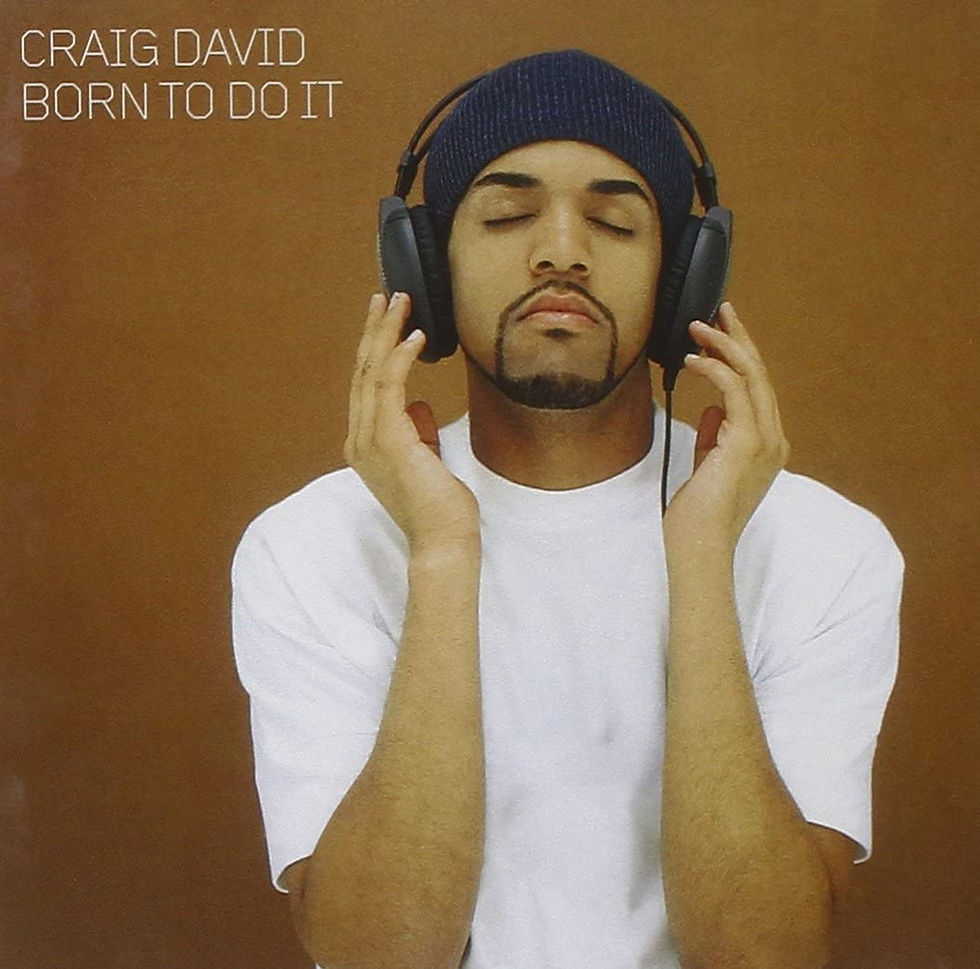
Niraj: I’ve known Mark for many years and he signed me to his publishing company, I learnt a lot from him, he was like a mentor to me in terms of what I was doing with him. It was more about pop music, as a pop producer.
This helped me with my personal albums too. What I learnt from Mark in the pop industry and from TV scoring has been invaluable with what I did with my own stuff. When you work with excellent people like Mark Hill, or the BBC, it changes the way you view things. It changes things because it means you having to be excellent. You’re working with excellent people and they won’t have anything less.
Djinn: You produced some songs on the Liberty X album as well, were you under a lot of pressure on that project?
Niraj: Yea, with that game, the pop game you’re doing a lot of cuts, so you’re doing a lot of tracks, so you need to do like 8 tracks to get one placement, and they cherry-pick one they want. I recorded at Metropolis Studios UK. What I found out about pop music is that it's very ruthless, I didn’t stay in it for very long, maybe 2 to 2.5 years then I came back to doing stuff which was my own albums and scoring for TV which I prefer.

I did a movie called All In Good Time, with Meera Syal and Harish Patel, a Studio Canal Film. I also did the first feature film of Our Girl which was later turned into a series for BBC1. I’ve done Simon Charmers Power Of Art. It's all in the list including BBC’s Darwin Dangerous Idea and Age of Terror.
Djinn: How do you usually work?
Niraj: Now it's all online, sometimes it's already shot, Age of Terror I scored from just the script which was about the history of terrorism. So, part of you, you don’t know the aesthetics of what they’ve shot or what it looks like and you just kind of hope you get the right tone. Most of it works. It was lucky, I guess. You kind of try to get an idea of the scale they are working to and score according to that.
Djinn: If you now look on YouTube and social media companies are coming forward who offer sync licensing agreements where you pay a fee for them to pitch your work. What is your advice to people who are paying large amounts of money to these companies?
Niraj: I don’t have any experience with these companies. I think just be mindful of what they are charging and how reasonable it is, and also what your term is. If they don’t manage to get anything placed, when do you get your rights back? That’s your work, that copyright is your legacy, your hard work. If they are taking you for a ride, you need to minimise the risk of them taking you for a ride for very long. The fundamental thing is, if these people are successful, you’re going to stick with them if they are getting you placements, you’re going to stick with them, they won’t need more than a year. If they haven’t got you a placement then you're probably better off without them.
Djinn: I think social media has changed the way this all works; it's taken over what we didn’t have to deal within 02 to 05. Back then we dealt with real phone calls and people. Not social media, PayPal payments and online payments. With a lack of knowledge, I think artist are being taken advantage of because they don’t have the know-how required to do things the correct way. Nowadays an artist with releases on Spotify doesn’t know what an ISRC code is. I think artists need to educate themselves for self-empowerment. What’s your take on that?

Niraj: It will help you. I don’t think artists specifically need to educate themselves. I don’t think there is any hard and fast rule. I try not to think of anything as a right way or wrong way. I just think that its fine. If you don’t know s**t then its fine as long as your ideas are good. There are people out there with fantastic ideas who don’t know how to realise them. Why should I discredit them because they don’t know the tech? Look at Steve Jobs, he wasn’t a technician but just had great ideas. Your ideas are king. A smart person would have ideas and realise them themselves because fundamentally you become more autonomous, you can have more ideas and realise them quicker. Whereas being dependent on people you are spending money and resources on that, so to have ideas and have skills to realise them you’re a far better and efficient machine. Fundamentally it doesn’t matter. If you have the money to pay someone else to do it, then that’s all good. If you have a hit on Fruity Loops after making your first beat, it's all good. I think that I don’t like to hate anything or anyone in this, I think everybody is on their own path and that’s all good.
Djinn: What can people expect from Niraj next?
Niraj: The main thing I am interested in right now is Rich Ganja, the first video is out next week
Djinn: I probably won’t have this transcribed by next week as its freaking long, (Both LOL) but I’ll post a link within the post. (Niraj opens the finished video to show me) excellent work.
End of the interview. Below links to Niraj's social media. (Opens in new page)
Follow, Share, Comment, Like!



















Comments